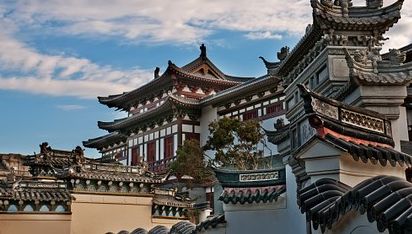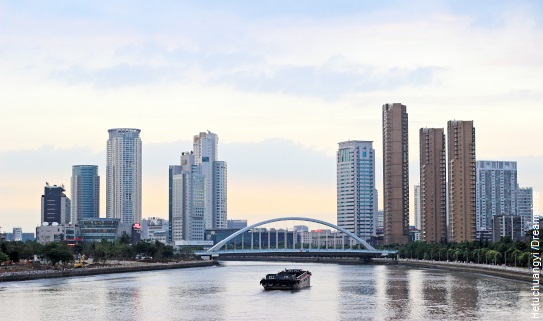Meet Sharon, The Cashmere Boss Lady.
Just like our cashmere, we are constantly on the hunt for the best quality manufacturers. Our criteria are plentiful including but not limited to the conditions of the factory, the safety and well-being of the workers, and the environmental standards upheld by the factory operators.

We also have some unique demands of our suppliers. We need to find partners who are able to produce small quantities on-demand so we can minimize textile waste. That's a challenging undertaking for most mass apparel producers.
One of our first cashmere suppliers is Dankeyun, based in Ningbo - about two hours outside of Shanghai - and the home of premium knit production. They are changing the way premium knits are made at scale.
We really want our customers to know the people behind the clothes because they're all bad asses (and 80% female). So we sat down with Sharon - head of sales and expansion at Dankeyun - to get to know her side of the story.
PH: Tell us a little about yourself.
Sharon: I’m Sharon from Ningbo in Zhejiang province, near Shanghai. I work for Dankeyun, a sweater manufacturer established in 1993. It’s almost 30 years old! We have our own brand as well called Dankeyun with 300 stores throughout China. I am the Assistant GM responsible for all marketing and expansion. Before, I was responsible for production since we need to be familiar with production to understand how to do marketing.

Old and new Ningbo still exist side by side.

Ningbo is home to around 7 million people
PH: Why is your English so good?
Sharon: I don’t think it’s very good but I guess it’s because i studied in London for 7 years for high school through my undergraduate degree and postgraduate degree. I studied electrical engineering for undergrad, risk management and finance.
PH: Wow. That’s impressive. From electrical engineering and risk management to apparel production. When you were a child, what did you want to be when you grew up?
Sharon: I wished I could be a regular office lady working in the CBD!
'MY MOTHER AND AUNT STARTED THE COMPANY IN 1993.'
PH: How did you end up at Dankeyun?
Sharon: My mother (who is now the GM) and aunt started the company. After graduation I was working in finance when my mother told me that they needed my help to contribute to growing Dankeyun and transforming the business. She wanted to invest in technology to turn it into an intelligent factory and thought I could help with this project more than I could impact my other work.
PH: What is unique about Dankeyun and how you think about manufacturing?
Sharon: We have an automated, intelligent factory. We invested last year to focus on customizing sweaters at scale. We are the only factory of its kind in all of China. In China, factory labor is harder and harder to find. As standards of living have increased, people just want to be office ladies like you and me and don’t want to work in factories. So, it’s really important for factories to become intelligent. It will help the factory to cut down labor costs and be more efficient. If a factory doesn’t change and continues on a very traditional path, it will not go very far in the future.
automating a factory
PH: How was Dankeyun able to make this change? Why don’t we see it more often?
Sharon: It’s very difficult to change. It’s very complex to convert traditional manufacturing lines into a smart, data-driven operation. For example, typically factory workers aren’t very highly educated but in order to change to a highly automated factory, you need different expertise and technology experience to run it. Plus it costs a lot of money to change the infrastructure. It’s really hard to get the right people, experience, the right data accumulation, and invest in the necessary tools.
PH: What was the hardest part in converting to an intelligent factory?
Sharon: In 2000, Dankeyun began using computers to manage our factory and start accumulating data. At that time, most factories were writing down everything on paper and using more people to manage the processes. The hardest part was trying to standardize production standards and automate based on data. Now every worker can see the data on the monitor for every sweater (we need to make) and that’s all they need.

China's PUSH TOWARDS MORE CUSTOMIZATION AND EFFICIENCY
PH: What is the biggest change you have seen in textile manufacturing in your career?
Sharon: The level of customization is higher because the increase in clothing inventory is a crucial problem in China. This is a very serious problem in the whole industry. The Chinese government also wants to push customization in manufacturing so that we produce what the customer needs instead of producing ahead of time and then trying to sell what we produced. They are investing in factories to become smarter.
PH: That’s exactly what we believe in at Public Habit! Do you think the average customer in China is aware of this problem of excess inventory?
Sharon: I think it’s very well understood by people in China. Even my friends know that too much stock is a really big problem. Everyone knows that there is overproduction because there are sales at the end of the season.

'People buy cashmere because they understand the value of high-quality cashmere'
PH: You specialize in cashmere production. How do you ensure that the yarn you source is at the quality you need and that the grazing conditions of the goats are good?
Sharon: This is very very important to us. People buy cashmere because they understand the value of high-quality cashmere. Our customers demand that it needs to be really good, they won’t accept less. We cooperate with a yarn supplier, Consinee, who is also based in Ningbo. They know cashmere better than anyone in the world because 90% cashmere is produced in China. They supply to some of big luxury brands i.e. Louis Vuitton and Burberry. We have grown up together with Consinee so there's a lot of trust.
PH: What do you hope for the future of the fashion industry?
Sharon: I hope the level of intelligence in manufacturing becomes really high in the future, and the lead time for customization could be eliminated completely. In this way the fashion industry could focus more on product design and development instead of how to sell stock. At the same time every customer could be their own designer, which means the customization comes true for the whole industry. Everyone could enjoy the fun from fashion and design.
We hope you enjoyed our interview with Sharon. As always, if you have questions or think we missed something, please comment below or email us at hello@publichabit.com.



